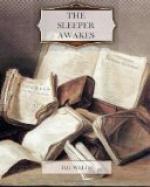“Have you never seen him since that time?” asked Warming.
“Often wanted to come,” said Isbister; “but business nowadays is too serious a thing for much holiday keeping. I’ve been in America most of the time.”
“If I remember rightly,” said Warming, “you were an artist?”
“Was. And then I became a married man. I saw it was all up with black and white, very soon—at least for a mediocrity, and I jumped on to process. Those posters on the Cliffs at Dover are by my people.”
“Good posters,” admitted the solicitor, “though I was sorry to see them there.”
“Last as long as the cliffs, if necessary,” exclaimed Isbister with satisfaction. “The world changes. When he fell asleep, twenty years ago, I was down at Boscastle with a box of water-colours and a noble, old-fashioned ambition. I didn’t expect that some day my pigments would glorify the whole blessed coast of England, from Land’s End round again to the Lizard. Luck comes to a man very often when he’s not looking.”
Warming seemed to doubt the quality of the luck. “I just missed seeing you, if I recollect aright.”
“You came back by the trap that took me to Camelford railway station. It was close on the Jubilee, Victoria’s Jubilee, because I remember the seats and flags in Westminster, and the row with the cabman at Chelsea.”
“The Diamond Jubilee, it was,” said Warming; “the second one.”
“Ah, yes! At the proper Jubilee—the Fifty Year affair—I was down at Wookey—a boy. I missed all that.... What a fuss we had with him! My landlady wouldn’t take him in, wouldn’t let him stay—he looked so queer when he was rigid. We had to carry him in a chair up to the hotel. And the Boscastle doctor—it wasn’t the present chap, but the G.P. before him—was at him until nearly two, with me and the landlord holding lights and so forth.”
“Do you mean—he was stiff and hard?”
“Stiff!—wherever you bent him he stuck. You might have stood him on his head and he’d have stopped. I never saw such stiffness. Of course this”—he indicated the prostrate figure by a movement of his head—“is quite different. And the little doctor—what was his name?”
“Smithers?”
“Smithers it was—was quite wrong in trying to fetch him round too soon, according to all accounts. The things he did! Even now it makes me feel all—ugh! Mustard, snuff, pricking. And one of those beastly little things, not dynamos—”
“Coils.”
“Yes. You could see his muscles throb and jump, and he twisted about. There were just two flaring yellow candles, and all the shadows were shivering, and the little doctor nervous and putting on side, and him—stark and squirming in the most unnatural ways. Well, it made me dream.”
Pause.
“It’s a strange state,” said Warming.
“It’s a sort of complete absence,” said Isbister. “Here’s the body, empty. Not dead a bit, and yet not alive. It’s like a seat vacant and marked ‘engaged.’ No feeling, no digestion, no beating of the heart—not a flutter. That doesn’t make me feel as if there was a man present. In a sense it’s more dead than death, for these doctors tell me that even the hair has stopped growing. Now with the proper dead, the hair will go on growing—”




